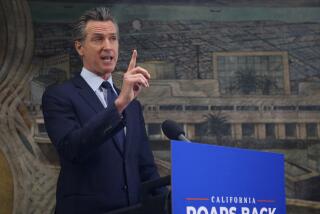Rise Above the Petty Partisanship Below : Washington faces the same budget stalemate that bedeviled Sacramento
- Share via
The other day the President took time off from the tense and worrisome Persian Gulf crisis to lambaste Congress for inaction on the budget crisis. But nothing Bush said either illuminated the problem or added measurably to its solution. He did not exactly confuse his Democratic critics with Saddam Hussein, but his statement seemed as partisan and petty as the attacks by his critics on the other side of the congressional aisle.
It’s a pity that the President can’t act as presidential in the domestic political arena as he does so commendably--and often--in the international arena.
Partisan politics is, of course, nothing new to Americans, and perhaps, in part, is what helped make this country what it is today. But there seems little place for it at a time when the federal budget needs to be cut substantially, and the political process seems so close to catalepsy.
It’s true that the President disavowed his no-new-taxes pledge made in the thundering ambition of his 1988 campaign. He deserves credit for that. But he cannot ride on that goodwill forever. He will have to do even more if America is to have a sensible budget and not the meat-axed one that will result, in due course, under the rigid sequestering provisions of Graham-Rudman-Hollings.
The onus is on Bush because it is plain that Congress itself is too gnarled up in its own internal contradictions to produce genuine national leadership. Just as the state Legislature in Sacramento wound itself into a total knot as the clock ticked down and a budget agreement became ever more elusive, so too is Congress now in the throes of producing a similar lackluster performance. And, far more than Gov. George Deukmejian, President George Bush has the political genes--as evidenced in his political instinct as well as basic personality--to be able to bend a little at just the point that some flexibility is needed to keep the process working.
The formula for budgetary process is no secret. Both sides of the aisle must agree on a combination of revenue increases and spending cuts to bring down the deficit. The task is complicated by the gulf crisis, obviously, but is still a job even mere mortals can do--if they have the will. The Times has suggested a thoroughly political deal combining new tax rates for higher-income Americans with lower taxes on capital gains. The point is to break the budget impasse before it triggers economic crisis. That means both sides must abandon ideological shibboleths and compromise for the good of the country.
More to Read
Get the L.A. Times Politics newsletter
Deeply reported insights into legislation, politics and policy from Sacramento, Washington and beyond. In your inbox twice per week.
You may occasionally receive promotional content from the Los Angeles Times.










